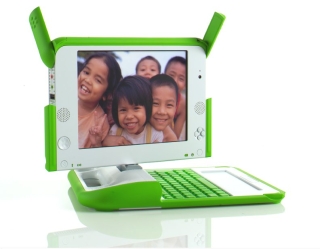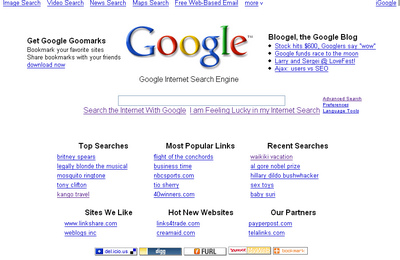Nicholas Negroponte has been in the news for a long time as the boss of the legendary “Media Lab” @ MIT. Now in his sixties Negroponte has stepped down from that job and pursues the “1 laptop per child” initiative (OLPC).

Check out one of these videos (18 min, 55 min)
“Imagine a world where all school-age children own a laptop computer, even those living in villages lacking power and telephone service. With backing from News Corporation and Google, among others, Negroponte has begun to line up millions of orders from Brazil, Thailand, Egypt, China and South Africa. Even the United Nations has bestowed its imprimatur on the concept.
Negroponte’s prototype computer is a “skinnied down” version of what he describes as the typical “obese” laptop. Remove sales and marketing costs, and set the machine up with a 7.5″ screen, Linux software, a hand crank for power, rugged rubber case, and super bright display so “it can be taken into the sun and read like a book,” and you’ve got a very inexpensive tool for helping 800 million children explore, interact and create.
Negroponte casts a wary eye on the potential grey market appeal of the machines, and is determined to make them so distinctive as a government-distributed, educational tool that taking one would “be like stealing a post office truck.”
Negroponte concludes, “Changing education on the planet is a monumental challenge,” taking decades. But OLPC will “seed the change,” and help “invent the future.”Â
Check out the OLPC FAQ for more detail on how they plan to make 100$ laptopsÂ
“The proposed $100 machine will be a Linux-based, with a dual-mode display—both a full-color, transmissive DVD mode, and a second display option that is black and white reflective and sunlight-readable at 3× the resolution. The laptop will have a 500MHz processor and 128MB of DRAM, with 500MB of Flash memory; it will not have a hard disk, but it will have four USB ports. The laptops will have wireless broadband that, among other things, allows them to work as a mesh network; each laptop will be able to talk to its nearest neighbors, creating an ad hoc, local area network. The laptops will use innovative power (including wind-up) and will be able to do most everything except store huge amounts of data.”
I guess data storage will be provided by Google (or similar) profiting from ads like with Gmail.
Amazing project – certainly one to track and support!
Check out the wikipedia entry for interesting additional info, like criticism from industry, 3rd world country leaders etc….







